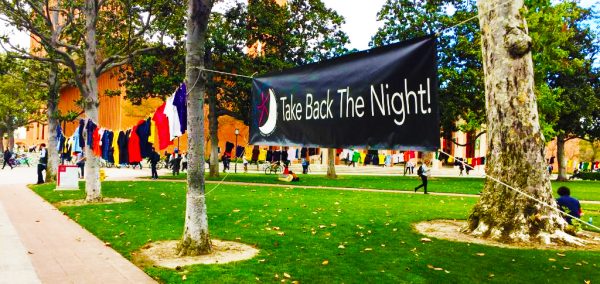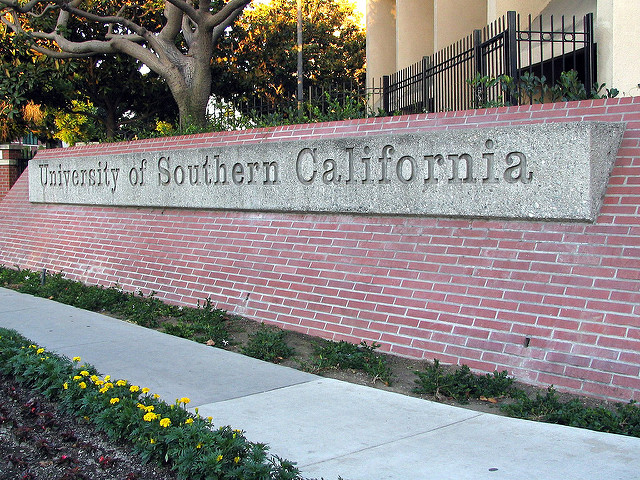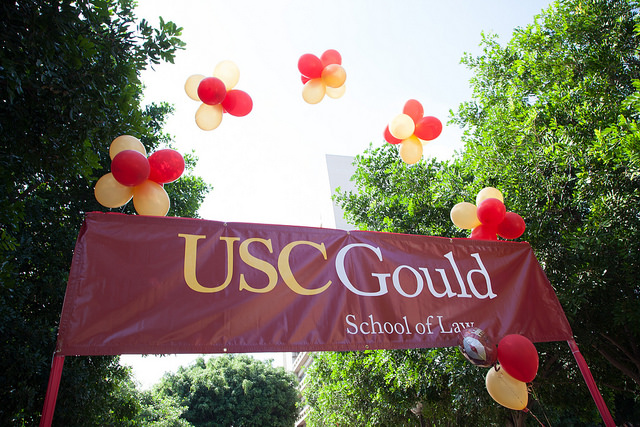
How USC’s facade of activism sabotages individual justice for sexual assault victims
Down the wormhole of USC’s Title IX process
In the past year, USC has hosted a series of events concerned with ending sexual assault and rape on campus. The Consent Carnival, Take Back the Night and Denim Day were all sponsored by student organizations and focused on building awareness of the issue.
But for all of the university’s focus on social justice, the question remains how successful the administration has been at achieving justice for survivors of sexual assault.
The recent arrest of a USC student for alleged rape is seen as a Title IX success story. Nonetheless, this case was handled by LAPD, not USC, and the Title IX proceedings remain unclear.
USC offers one of the worst case studies of a larger issue – how effective universities and the Title IX system are at convicting sex criminals. In the horrific instance that you are assaulted on campus, how well-equipped are a panel of academics and administrative staff at getting victims the justice they deserve?
The university spends a lot of resources on events to bring attention to the problem of sexual assault and rape on campus, but hasn’t created a system that brings sufficient solutions. The problem is not a lack of awareness, it’s a flawed reporting and investigation process. The Tab USC looked at the university’s Title IX resources for reporting sexual assault and evaluated the effectiveness of their preventative measures. We found students are mostly unaware of the resources available to them, and resources inadequate for ensuring justice for survivors and deterring future assaults.
The troubling statistics reveal USC’s ‘prevention’ has not posited any real progress
According to the 2015 AAU Campus Climate Survey on Sexual Assault and Sexual Misconduct, approximately 14.5 percent of students have experienced nonconsensual penetration involving force or incapacitation since attending USC. Even more horrific is the attitude regarding USC’s resources. According to the same report, only 25 percent of students feel they are very or extremely knowledgeable about how the university defines sexual assault and misconduct, 23.8 percent know where to find help at the university if they are a victim, 24.9 percent know where to make a report of assault, and 11.5 percent know what happens when a student makes a report.
Furthermore, among victims of penetrative acts involving force who did not report the assault, 30.1 percent did not think anything would be done about it, 15.6 percent did not know where to go or who to tell, and 21.1 percent feared it would not be kept confidential. For victims of nonconsensual sexual touching due to physical force, 27.5 percent did not think anything would be done about it. Without access to legal aid, the outcome of Title IX cases may, in fact, result in absolutely nothing being done.
With all of the university’s focus on displays of solidarity and activism, the statistics do not reflect any real improvement. DPS reported that sexual offenses fell from 33 in 2013 to 31 in 2014 before rising to 41 in 2015.
Often times, conversations about sexual assault and rape on campus simply reiterate the same “bad news” about statistics instead of offering any constructive contributions or practical solutions. Calling out rape culture and commending the university’s tepid attempts at prevention programs is a trite and wishy-washy response that fails to get to the root of the problem. While there has been a proliferation of awareness education incorporated into orientation or activist events, they are not very effective. It is not enough to just keeping acknowledging that there is a problem, universities need to start putting their money where their mouth is and do something about it.
A ‘proactive’ waste of time and resources?
There is not enough of a focus on funding and promoting services at USC like the Engemann Student Health Center’s Relationships and Sexual Violence Prevention Center (RSVP). RSVP provides 24/7 crisis services, individual and group therapy, counseling on reporting and legal options, and assistance with Title IX policy. Despite the range of helpful services RSVP provides, they are unfortunately, unknown to most of the student body.
Instead of ensuring adequate funds for their counseling services and reporting assistance, USC has dedicated their time and money on other “proactive” programs and events. For example, in compliance with mandatory Title IX regulations, USC has an online training program for new students called “Think About It.” According to the USC Student Affairs webpage, this is “an online course that encourages you to reflect critically on such topics as healthy relationships, consent, dating violence, sexual assault, bystander intervention, and university resources and reporting options available through the university’s administrative process and through local law enforcement.”
“To be honest, I didn’t find it helpful at all. I mostly just pressed next,” Sarah, a freshman who completed the program, said.
Sarah also admitted that she is unsure where to go or what to do if she or someone she knows is sexually assaulted. Unfortunately, Sarah’s situation is not unique. Despite the efforts of the university, their programs are not helping students become aware of the resources available that will help survivors of sexual assault and rape.

Moreover, the university’s allocation of funds to organizations to put on awareness events is not much help either. Last January, USC supported a “Consent Carnival” that was student run and paid for by the Queer and Ally Student Assembly, Women’s Student Assembly, and USC Residential Education. Intended to promote giving and receiving consent, the event’s “gimmicks and games trumped substance.” The message was confusing and unclear, and the impact was dubious.
Promotion and attendance were low, and those who participated were members of the groups who organized the carnival. In other words, the participants were already passionate and aware of these issues, and the target audience, who needed to be informed, was missed.
These are superficial displays of activism that often lack depth or sacrifice practical impact in an attempt to make the subject matter interesting and approachable. Combating sexual assault and rape and empowering survivors doesn’t have to be a game or a grand display for people to take it seriously; the system just has to work. Furthermore, marching across campus carrying a mattress or speaking at a rally may be empowering to some survivors, but others might find such events isolating and unhelpful. Many survivors don’t want to share and relive their traumas; they want to report the crime that has been committed against them and know that their case will be treated with sensitivity, respect and will result in appropriate punishment for the attacker and peace of mind for the survivor.
Steps of the reporting process
When a student is assaulted, the Sexual Assault Resource Center (SARC) first recommends that the student preserves all physical evidence of the assault, gets medical attention, and seeks out a trusted friend. It then offers information about counseling from RSVP and reminds the student that he or she has the right to file an official report.

Next, SARC outlines a student’s reporting options and “encourages students and employees to report these crimes but the decision is up to the person who has been sexually assaulted.” There are several departments to contact if a student wishes to report an assault, including the USC Department of Public Safety, The Office of the Title IX Coordinator and the USC Office of Equality and Diversity.
In connection with reporting sexual assault, a student has the right to: be “treated with respect and dignity,” not be discouraged from or pressured into reporting or any other suggestions, request an investigation through the Office of the Title IX Coordinator, report or decline to report the crime to law enforcement outside of USC or to DPS and have the “full and prompt cooperation from campus personnel in obtaining and securing evidence necessary for any potential criminal proceedings.”
USC is currently under investigation by the federal government for alleged violations of students’ Title IX rights after being accused of mishandling and underreporting sexual assault and rape cases.
Additionally, there is no mention of a right to legal counsel. According to the SARC website, “the university does not offer attorney services but RSVP can assist with filing in court for an order of protection.” RSVP doesn’t have any lawyers on staff and can only provide advocacy and emotional support.
The SARC refers students to the Legal Aid Foundation of Los Angeles as well as the State Bar of California that only provide the student with “resources to help find an attorney,” not actual access to one. Furthermore, the Legal Aid Foundation of Los Angeles does not provide pro bono attorneys, only ones with hourly rates starting in the hundreds of dollars.
The Tab USC reached out to Ainsley Carry, Vice President of Student Affairs, for a deeper explanation of the reporting process and the administration’s role, but he would not give a comment and responded that all media inquires regarding Student Affairs are guided through the Director of Media Relations, Eddie North-Hager. Carry was quoted in the Daily Trojan about how “sexual assault activism has stalled” recently. Well, we banged on Carry’s door — or in his email, if you will — but he denied our attempt to delve deeper into the root of the problem and discuss solutions. Students are “fired up,” but Carry was not willing to listen.
The Tab USC followed Carry’s recommendation and emailed North-Hager with the same inquiries. North-Hager simply copied and pasted the links to the SARC website in his reply. This response was unhelpful, leaving us with more questions than answers. Moreover, the unwillingness of these administrators to give students answers to important question regarding sexual assault exemplifies the problem at USC.

A total lack of legal support for assault survivors
Unlike other major universities, USC does not offer pro bono lawyers to students who report or are accused of sexual assault. The Title IX Office does not even track the statistics of those who request lawyers as advisors. Additionally, the policies concerning how lawyers can be involved are vague and seemingly contradictory. According to USC’s Student Misconduct Policy, if a student requests a lawyer as his or her advisor, the lawyer can’t speak on the student’s behalf, because “an advisor is not an advocate” and “may not testify in or obstruct an interview, or disrupt the process.”
However, according to Gretchen Dahlinger Means, the university’s Title IX Coordinator, “should either party be working with an attorney formally or informally and they choose to submit a written response at the [Evidence Hearing] stages, it would not be surprising if the attorney assisted.” So it is unclear just how much of a role an attorney is allowed to have in these kinds of proceedings.
If the university does not provide free legal counsel from outside attorneys for the accuser and the accused in sexual assault and rape cases, perhaps USC could use resources it already has. The possibility here is for the administration to utilize USC Gould School of Law students who are knowledgeable, willing to help, and are available within the university’s reach. This way, there is a potential for all parties involved to benefit: rape victims get free legal counsel, a Gould student gains valuable experience and USC doesn’t have to spend a dime.

Providing good emotional and legal counsel is not about telling survivors what to do or how to feel, it’s about giving them all the resources, advice and options they need in order to decide what course of action is best for them. Too often, attacks go unreported because the survivors are misinformed or afraid to file a report. And too often, those apprehensions are confirmed.
Students should be better informed about where and how to report rape or sexual assault, and the process needs to be helpful, comfortable, unobtrusive and flexible. Attorneys will help survivors navigate through this process, while the administration needs to ensure that the reporting process works; reporting an attack means nothing if there is no follow through. Additionally, the involvement of attorneys will demonstrate that these types of cases are to be taken seriously.
USC treats rape akin to foul comments or cheating instead of a violent felony
According to a study in Aeon Magazine, most college-aged rapists “were not only unafraid of punishment, but blissfully unaware that what they did was criminal.” When rapes and assaults are reported and perpetrators are punished, it does not only provide justice for the individuals, but it is a means of preventing future crimes.
Events that simply address a problem that most people know exists fail to provide constructive solutions or reach a broad audience. While awareness should continue, it should not be the entire scope of the university’s focus. Instead, USC should make sure that the Title IX Office and RSVP are well funded and promoted as helpful resources. Free legal counsel should be provided to support students and to ensure justice. The mandatory programs also need to be revised; in-person programs in small, intimate groups would be a lot more effective than an online game that students rush through.
Sexual assault and rape cases are serious, and should be treated as such. To diminish these rates, the reporting and investigative processes should be accommodating to both parties involved to end the stigma that universities care more about their reputations than their students’ well-being. No carnivals, clotheslines or computer courses can produce the same message and results as evidence that the system works.
